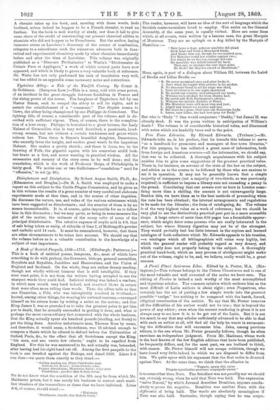A Book of Scottish Pasquils, 1568-1715. (Edinburgh : Patterson.)— This
is a book of satirical poems, lampoons, Bre., most of which have something to do with prelacy, the Covenant, bishops, general assemblies, Royalists and Royalists, Jacobites and Hanoverians, and the Union of England and Scotland. On the whole, they are rather dreary reading, though not wholly without humour that is still intelligible. If they ever want point, it is not from the writers having scrupled to use the sharpest words they could find. Satirical writing was indeed a warfare, in which men struck very hard indeed, and received blows in return that were often more telling than words. Thus, the editor tells us that one Cracovius, a Pole, who was inhospitably received in Seotland,— hooted, among other things, for wearing his national costume,—revenged himself on his return home by writing a satire on the nation ; and that King James I. was BO provoked as to take the greatest pains to get him put to death, that he actually succeeded in getting it done, and, what is perhaps the most extraordinary fact connected with the whole business, that the King actually spent six hundred pounds (sterling, not Scots) to get the thing done. Another unfortunate man, Thomas Ross by name, and therefore, it would seem, a Scotchman, was ill advised enough to compose a thesis which he offered to defend before the Universities of Oxford, Paris, &c., to the effect that all Scotehmen except the King, "his acne, and ane verrie few otheris," ought to be expelled from England. For this he was sentenced to be, and actually was, beheaded, after having had his right hand oat off. Among the first pasquils in the book is one levelled against the Bishops, and dated 1638. Lines 2-6 run thus—we quote them exactly as they stand
Gallica papista est. Dives Caledonius sari.
Aulicus est Rosen: Lismoriensis inks. Pauper Aberdonius, Mormvius vafer ; ebrix sails Dunblanen: pandem dira Sodora fersa."
We do not know what the condition of the MS. may be from which Mr. Maidment prints, but it was surely his business to correct such mani- fest blunders of the transcribers as those that we have italicized. Lines 5-6, of course, should stand :—
"Ebrietutis "Dunblanen, fmudis dim Sodora fem."
The reader, however, will have an idea of the sort of language which the Scottish controversialists loved to employ. +The satire on the General Assembly, of the same year, is equally violent. Here are some lines which, at all events, were written by a famous man, the great Marquis of Montrose. They are an epitaph on a dog killed by the Marquis of Hamilton :—
"Heir layes a doge, quhosse qualities did plead Such fatal end from a Renouned blade, And blame him not, though he succumbed now, For Hercules could not combat against two; For whilst he on hes foe revenge did take He manfully was killed behind his back.
Then say, to eternize the curr thats gone, He noon the Hayden sword of Hamiltone."
Here, again, is part of a dialogue about William III. between the Laird of Brodie and Lilies Brodie :-
"B. He never promised once and after broke it. L. Save when he fought with articles in his pocket.
B. No innocent blood in all his reign was shed, L. Save all Glencoe in one night murdered.
B. He saved our country, and advanced our trade; L. Witness such product we from Darien had.
B. He acted still with Parliament's advice; L. Witness the private Articles of Peace. B. His Ministers were still most true and just;
L. Argyll and Stuart for avarice and lust.
B. But since he's gone, God save our Sovereign Lady.
L. Amen, says Linea, she had best pray for Dady."
But who is "Dady "? One would conjecture "Daddy," but James' IL was already dead. It was the poem written in anticipation of William's death ? The volume is of considerable historical value, and illustrated with notes which are laudably terse and to the point.






























 Previous page
Previous page